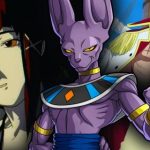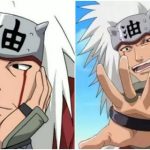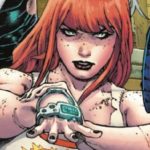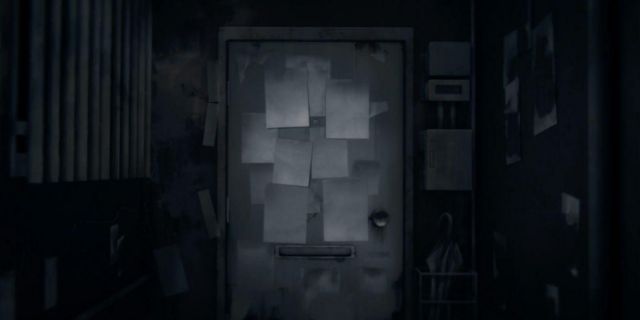The following contains spoilers for Episodes 1-4 of Chainsaw Man, now streaming on Crunchyroll, as well as light manga spoilers.
The beginning of Chainsaw Man opens not with a scene, but the sound of someone breathing heavily. The person raises their head and sees a dark and narrow alley. Stumbling, the young man walks forward before turning and coming to a stop at a door. The door is covered with numerous pieces of white paper, save for a peephole. His breathing gets louder, and he reaches out a hand. Just before it closes over the doorknob, the scene is abruptly cut off.
Chainsaw Man has received compliments for how faithful its anime adaptation has been thus far, but the premiere starts very differently from the manga. In the latter, the story opens with Denji and Pochita getting ready to kill the Tomato Devil. This change is small — but by adding it, MAPPA has already foreshadowed the emotional trajectory of Denji’s journey.
The Door in Front of Denji Symbolizes Potential for Change

In quite the literal sense, Denji doesn’t have much. In order to pay off his dead father’s debt, he sold one of his kidneys, his right eye, one of his reproductive parts and has done odd jobs now and then like cutting trees and killing devils. Even after all that, he still hasn’t made much of a dent in the debt. He doesn’t have much hope that his life will change and as a result, Denji’s dreams are simple: he wants a chance to live a normal life and do normal things like have a date with a girl. Something as simple as putting jam on his toast feels like a wistful fantasy far beyond his reach.
Becoming Chainsaw Man opens up a lot of doors for Denji. It offers him a chance for him to escape the impoverished life he’s in, and he no longer has to be treated like dirt by other people. The door represents hope and new beginnings. Turning into Chainsaw Man allowed him to meet Makima, who is giving him a shot at a normal life. He can now eat his toast with an outrageous number of spreads, and he has a job as a Public Safety Devil Hunter.
More importantly, Makima has given him a new, albeit dysfunctional, family with Aki and Power. Although his relationship with Aki is rocky when they first meet — after all, Denji kicked the living daylights out of Aki’s lower region — their relationship develops into a comfortable companionship by Episode 4 until Aki feels like an older brother to Denji. Similarly, Denji and Power are practically at each other’s throats in the beginning — with each finding the other obnoxious and disgusting in different capacities — but their bickering is reminiscent of the dynamic between siblings. In the tiny apartment with a chaotic Power and a serious Aki, Denji has found a home.
The Door Means Potential for Pain

Chainsaw Man’s manga readers, however, know exactly what the door means — and its implications. It’s probably the most haunting symbol in the story so far. In the manga, the devil dog Pochita visits Denji in his dreams and pleads with him to not open the door, but does not explain why. It is later revealed that Pochita had been trying to shield Denji from the traumas of his past. Doors offer a sense of protection, physically and mentally, because they act as a barrier.
Even without reading the Chainsaw Man manga, the door already sets the tone. Anime viewers know there’s something behind it that Denji is afraid of. It’s a double-edged sword: while the door symbolizes a chance for him to turn his life around, it also represents an equal chance for him to get hurt. The moment Denji opens himself up to other people, he’s also opening himself to watching those he’s close to get hurt — or potentially getting hurt by those same people.
Thus far, Denji has not been able to show any kind of autonomy; all his choices have essentially been made from the beginning. Everything in his life is conditional: if he wants to fondle Power’s chest, he has to help her get Meowy back; if he wants Makima to be nice to him, he has to be her dog. Even his very life is conditional because if he wants to live, he has to listen to Aki. In that sense, the door may represent the first time Denji will ever have any semblance of autonomy. Whether he chooses to open it or let it stay closed, it is ultimately his choice.










